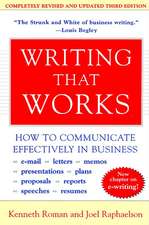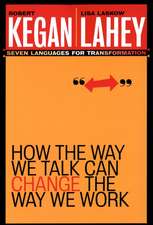Spark: How Old-Fashioned Values Drive a Twenty-First-Century Corporation: Lessons from Lincoln Electric's U
Autor Frank Kolleren Limba Engleză Paperback – aug 2011
Cleveland-based
manufacturer
Lincoln
Electric
has
thrived
for
more
than
a
century.
It
survived
two
World
Wars,
the
Great
Depression,
the
decline
of
industrial
America,
and
the
recent
credit
crash
with
impressive
profits.
While
factories
across
the
Midwest
fired
employees
and
shuttered
their
doors,
Lincoln
Electric
fulfilled
its
promise
of
“Guaranteed
Continuous
Employment,”
a
company
pledge
to
avoid
layoffs
for
economic
reasons.
By
promoting
loyalty,
trust,
and
flexibility,
Lincoln
Electric
has
built
a
company
of
committed,
hard-working
employees
and
a
reputation
of
excellence.
In
this
insightful
and
spirited
investigation,
journalist
Frank
Koller
digs
deep
into
Lincoln
Electric's
inner
workings—revealing
surprising
lessons
about
what
happens
when
managers
view
their
employees
as
valued
assets
rather
than
costs.
Preț: 160.45 lei
Nou
Puncte Express: 241
Preț estimativ în valută:
30.70€ • 32.12$ • 25.50£
30.70€ • 32.12$ • 25.50£
Carte tipărită la comandă
Livrare economică 02-16 aprilie
Preluare comenzi: 021 569.72.76
Specificații
ISBN-13: 9781610390538
ISBN-10: 1610390539
Pagini: 272
Ilustrații: none
Dimensiuni: 159 x 235 x 16 mm
Greutate: 0.34 kg
Editura: PublicAffairs
Colecția PublicAffairs
ISBN-10: 1610390539
Pagini: 272
Ilustrații: none
Dimensiuni: 159 x 235 x 16 mm
Greutate: 0.34 kg
Editura: PublicAffairs
Colecția PublicAffairs
Notă biografică
Frank
Kollercovers
the
workplace
for
the
Canadian
Broadcasting
Corporation.
Over
a
twenty-seven-year
career
with
CBC,
he
has
worked
and
lived
around
the
world
as
a
foreign
correspondent,
including
seven
years
in
the
United
States.
He
holds
a
Master's
Degree
in
Engineering
from
the
Massachusetts
Institute
of
Technology.
He
lives
in
Ottawa.
Recenzii
Publishers
Weekly
“A fascinating glimpse into this remarkable yet, in many ways, ordinary organization, which survives, even thrives, in a sunset industry where overseas outsourcing is the norm.... Instructive and heartening, this book offers a proven model for companies that not only want healthy bottom lines but also satisfied, dedicated employees”
Richard Freeman, Professor of Economics, Harvard University“In a time of recession, massive layoffs, and Wall Street bailouts,Sparktells the remarkable story of the better side of American capitalism: Lincoln Electric, the billion dollar manufacturer that succeeds by treating its employees the right way. This book should be required reading for everyone who wants to make the economy work for us all, from the President and his economic advisors to business leaders and employees everywhere.”
Harvard Business Review
“A fascinating depiction of a rare human resource practice in a company with a long and hearty track record—food for thought for the rest of us.”
Wall Street Journal
"Striking … against the backdrop of the layoff mania that has claimed more than eight million American jobs since late 2007.”
Akron Beacon-Journal
“A fascinating glimpse into this remarkable yet, in many ways, ordinary organization, which survives, even thrives, in a sunset industry where overseas outsourcing is the norm.... Instructive and heartening, this book offers a proven model for companies that not only want healthy bottom lines but also satisfied, dedicated employees”
Richard Freeman, Professor of Economics, Harvard University“In a time of recession, massive layoffs, and Wall Street bailouts,Sparktells the remarkable story of the better side of American capitalism: Lincoln Electric, the billion dollar manufacturer that succeeds by treating its employees the right way. This book should be required reading for everyone who wants to make the economy work for us all, from the President and his economic advisors to business leaders and employees everywhere.”
Harvard Business Review
“A fascinating depiction of a rare human resource practice in a company with a long and hearty track record—food for thought for the rest of us.”
Wall Street Journal
"Striking … against the backdrop of the layoff mania that has claimed more than eight million American jobs since late 2007.”
Akron Beacon-Journal
Norman
A.
Berg,
Professor
of
Business
Administration,
Harvard
Business
School
“Frank Koller has done a remarkable job of presenting both an economic and a moral argument for the value to society of the unusual policies followed with great success by Lincoln Electric for over a hundred years. The book is excellent in both the historical overview and the numerous interviews with current and past employees. There is much that modern management can learn about the benefits to employees, customers, shareholders, and communities by examining the role of the ‘old fashioned’ culture of Lincoln Electric.”
Thomas A. Kochan, George M. Bunker Professor of Management and Co-Director, MIT Institute for Work and Employment Research
“A timely book, well researched and well written. Business, labor, and government leaders would do well to readSparkas they search for more equitable and sustainable principles for rebuilding trust in management, and getting compensation once again growing in tandem with productivity and profits.”
“Frank Koller has done a remarkable job of presenting both an economic and a moral argument for the value to society of the unusual policies followed with great success by Lincoln Electric for over a hundred years. The book is excellent in both the historical overview and the numerous interviews with current and past employees. There is much that modern management can learn about the benefits to employees, customers, shareholders, and communities by examining the role of the ‘old fashioned’ culture of Lincoln Electric.”
Thomas A. Kochan, George M. Bunker Professor of Management and Co-Director, MIT Institute for Work and Employment Research
“A timely book, well researched and well written. Business, labor, and government leaders would do well to readSparkas they search for more equitable and sustainable principles for rebuilding trust in management, and getting compensation once again growing in tandem with productivity and profits.”












